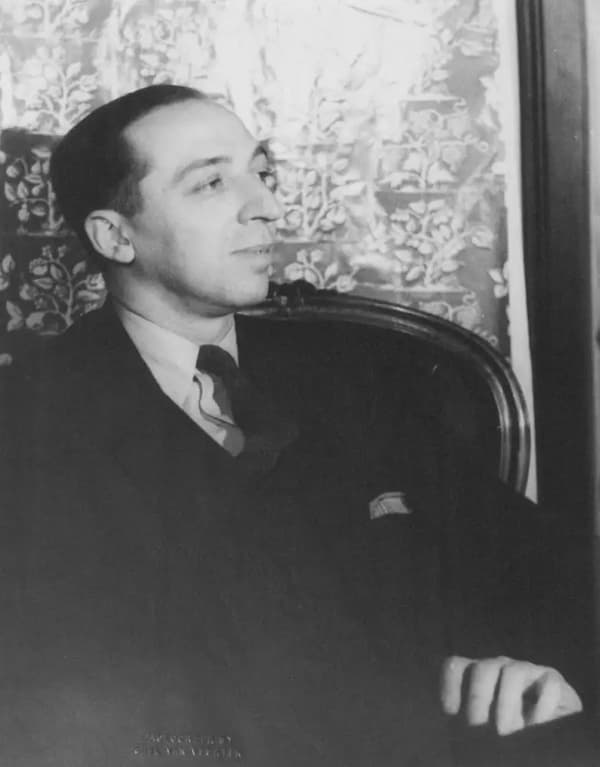We were looking at the Greek gods and thought we’d see how they’d fared in music. Some of them were subjects of whole operas or ballets, others were just characters who moved the action forward. All of them, however, have served as inspiration for modern composers to create works in which they come to life.
Zeus – father of the Gods
Italian composer Guido Facchin (b. 1946), made his work for harp and percussion, The Planets, based on the wonders of the sky, but with a different idea than Holst had. His movement on Zeus, the planet Jupiter, captures both the godly parts of Zeus (god of thunder, lightning, and of rain), and the physical parts of the planet, and its clouds of frozen ammonia crystals.
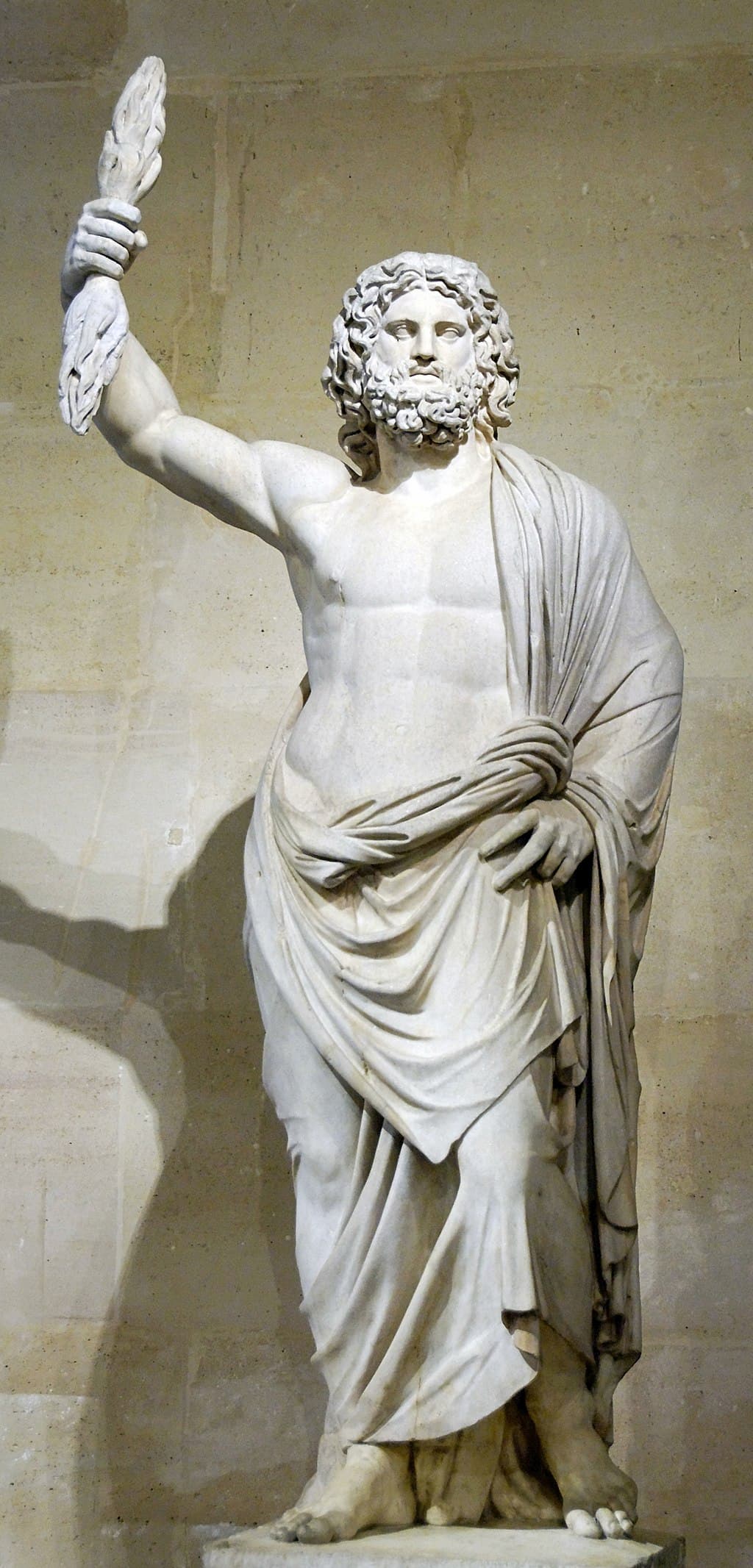
Zeus of Smyrna, holding a thunderbolt (Louvre Museum)
Guido Facchin: The Planets – II. Zeus (Giove), Re degli Dèi (Avalokite Duo)
Poseidon- son of Zeus and God of sea, storms, earthquakes, and horses
Australian composer Peter Dart (b. 1953) based his work for 2 pianos, Triptych, on texts from Homer. The third movement, Poseidon, takes its inspiration from the Iliad (book 13, line 54): ‘The ocean king who grips and shakes the earth’. Based on a repeated 12-note melody, this passacaglia contrasts the calm and tranquillity of Poseidon’s ocean home and the ‘havoc he wreaks as an earthquake rips through the Aegean’.
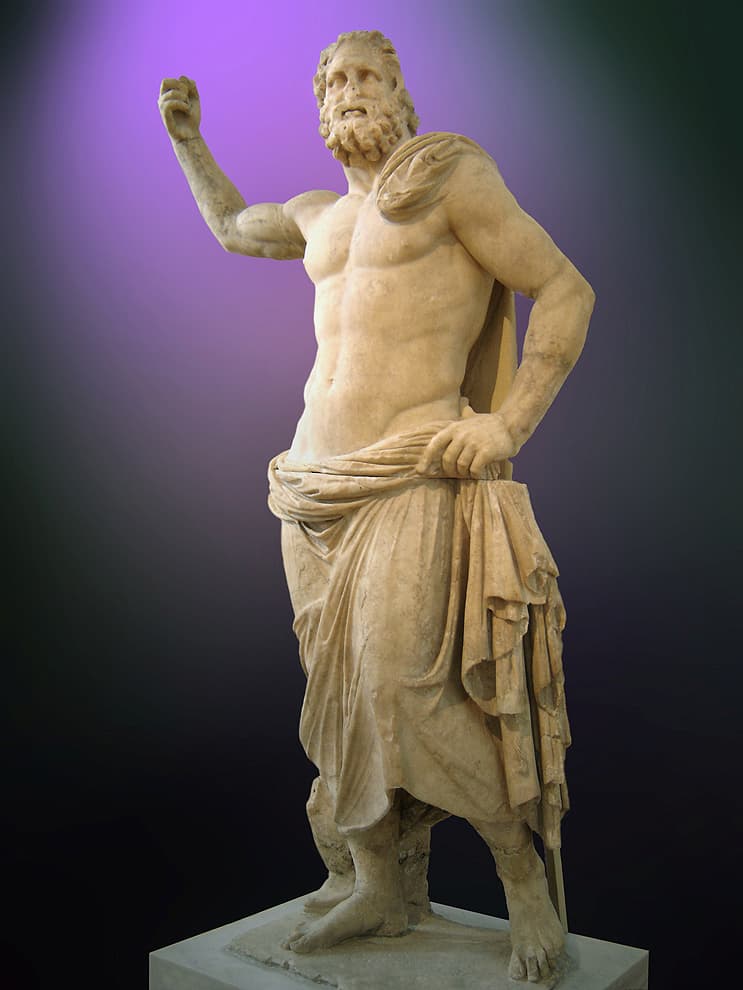
Poseidon (National Archaeological Museum of Athens)
Peter Dart: Triptych – III. Poseidon (Daniel Herscovitch and Clemens Leske, pianos)
Hera – sister/wife of Zeus, queen of the Olympians
José Suñer Oriola’s work El Jardin de Hera (Hera’s Garden), takes the story of Hera’s Garden, located in westernmost Greece and the source of the apples of eternal youth. We find the garden as part of the 12 Labours of Hercules, where Hercules was charged by King Eurystheus to steal some of Hera’s apples. However, there was a small matter of the guarding dragon, Ladón. Hercules tricks Atlas into defeating the dragon and getting the apples for him. The work is built around four themes: The Search (Hercules searches for the Garden), Ladón (the dragon), Nymphs (the three nymphs, Hesperetusta, Egle and Eritia, who care for the garden), and Escape and Return (Hercules’ successful tricking of Atlas and return with the apples).
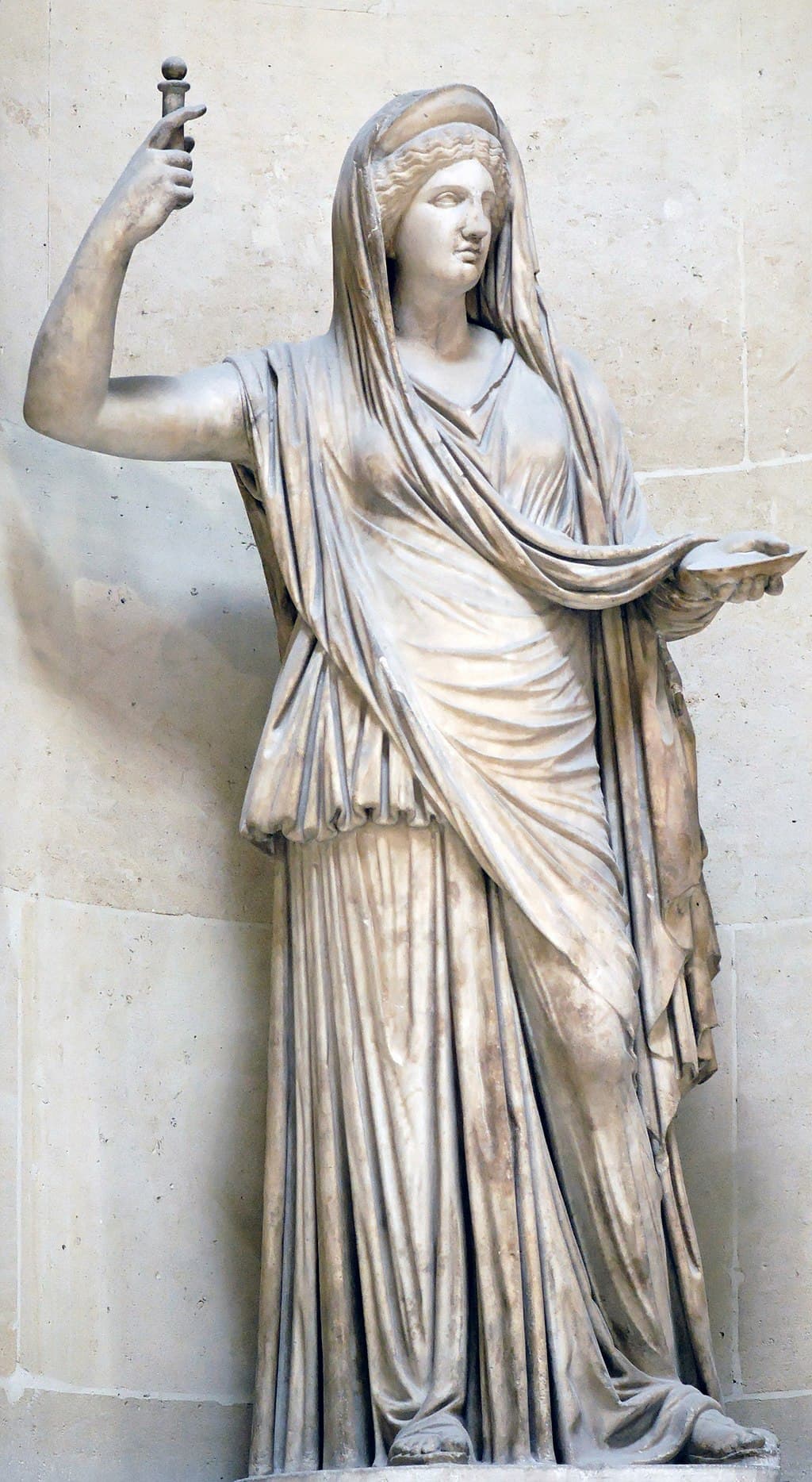
The Campana Hera (Louvre)
Jose Suñer Oriola: El jardín de Hera (Filarmónica Beethoven Campo de Criptana; Juan José Fernández Olivares, cond.)
Demeter – Goddess of the harvest, mother of Persephone
Polish composer Karol Szymanowski (1882–1937) set a poem by his sister, Zofia Szymanowska, telling of the sorrow of Demeter after her daughter has been stolen away by Hades and how her sorrow brings eternal winter to the world.
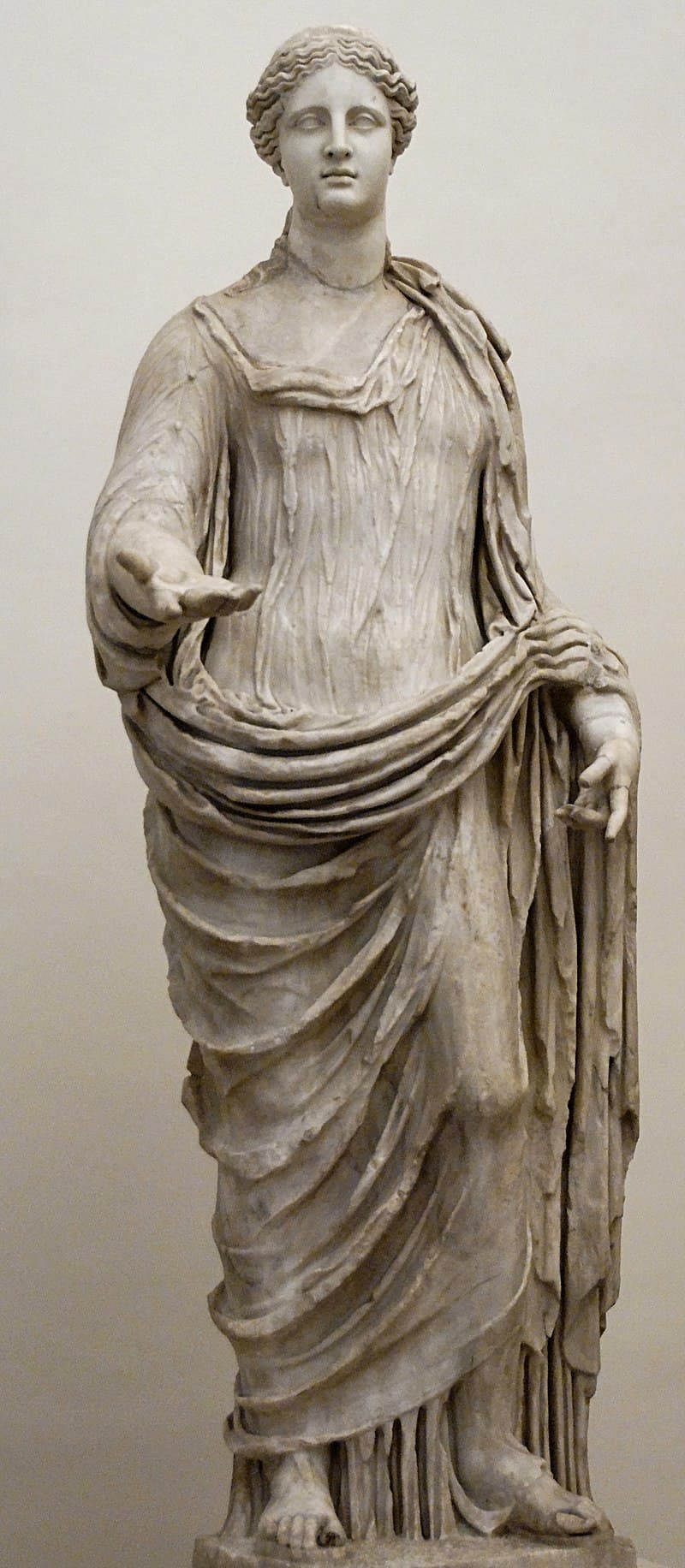
Demeter (Museo Nazionale Romano)
Karol Szymanowski: Demeter, Op. 37b (Ewa Marciniec, mezzo-soprano; Warsaw Philharmonic Choir; Warsaw Philharmonic Orchestra; Antoni Wit, cond.)
Aphrodite – daughter of Zeus, Goddess of love
English composer William Alwyn (1905–1985) used the Homeric novel Aphrodite in Aulis by Georg Moore as inspiration for his miniature image of the world of ancient Greece with its vision of Aphrodite.
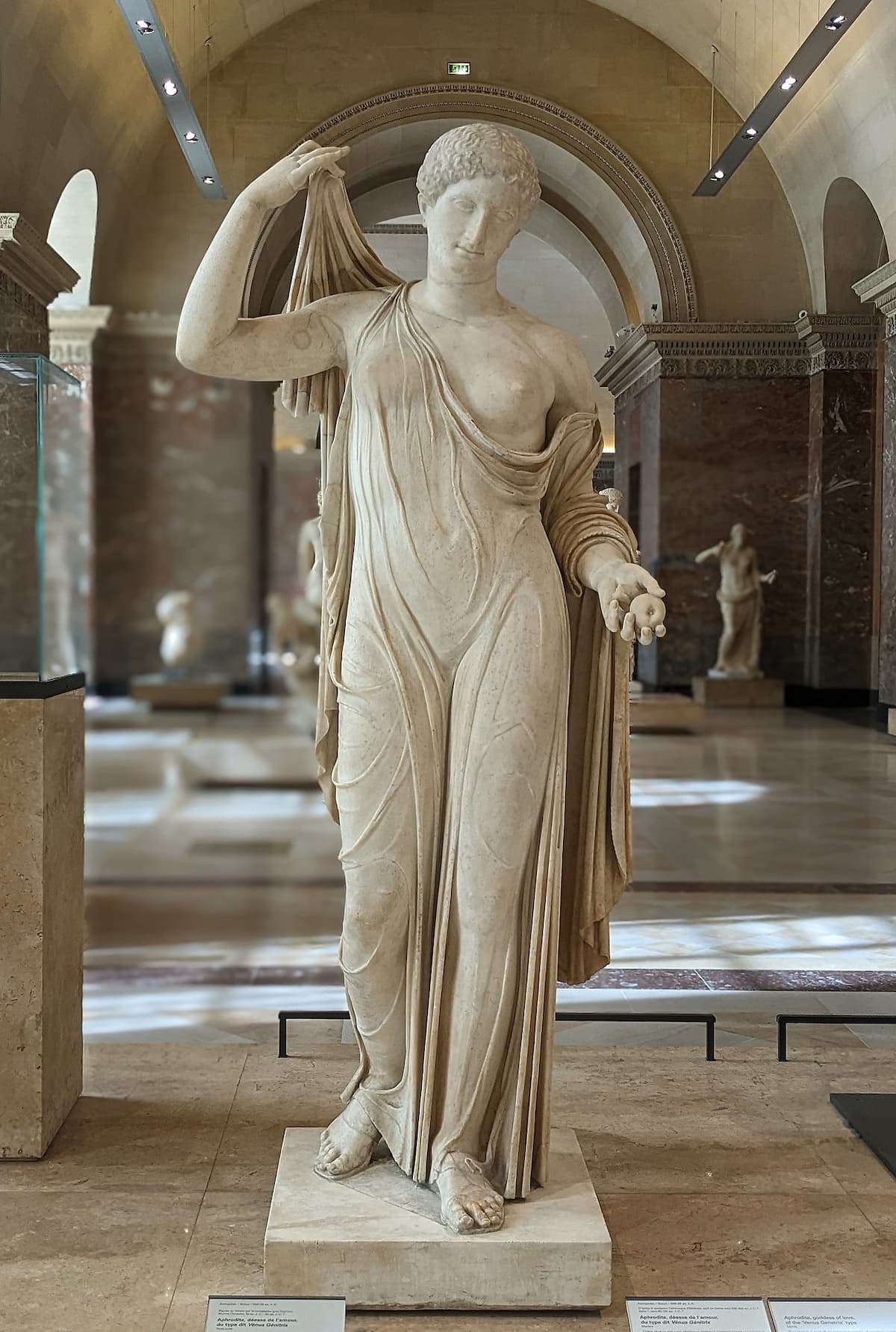
The Aphrodite of Fréjus (Louvre)
William Alwyn: Aphrodite in Aulis – An Eclogue for small orchestra after George Moore (Royal Liverpool Philharmonic Orchestra; David Lloyd-Jones, cond.)
Artemis – daughter of Zeus, Goddess of the hunt
In his cycle of brief works for the clarinet, The Monodies, op. 216, French composer Charles Koechlin (1867–1950) based one movement on Artemis, goddess of the hunt. Her most famous hunt was for Acteon, who, after seeing her bathing, tries to attack her. She turns him into a stag and his own hunting dogs attack and kill him.
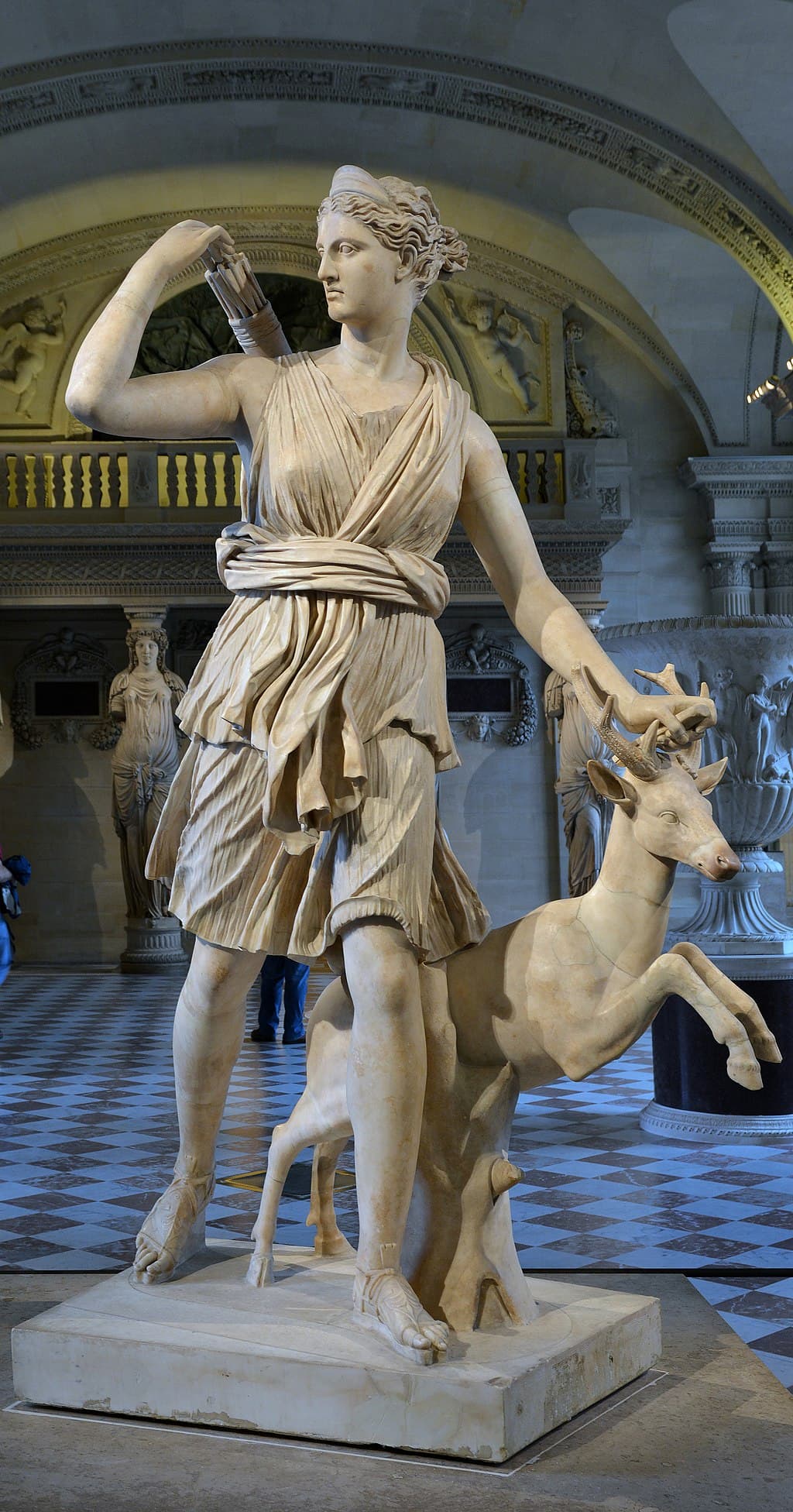
Artemis / Diana (Louvre)
Charles Koechlin: 11 Monodies, Op. 216 – V. La Chasse d’ Artemis (Dirk Altmann, clarinet)
Apollo – son of Zeus, God of music, archery, and the sun
A rich source of stories, Apollo has had many musical works based on his life and actions, including Francisco Cavalli’s Gli amori d’Apollo e di Dafne, Handel’s Apollo e Dafne, Stravinsky’s ballet Apollon musagète, Hans Warner Henze’s Apollo et Hyazinthus, and many others.
Henze’s (1926–2012) Apollo et Hyazinthus has been described as ‘a mixture of chamber music, symphonic poem, harpsichord concert, and song with orchestra’. It was one of Henze’s first twelve-tone pieces. It takes up the story of Apollo who loves Prince Hyacinthe, but accidentally kills him with a discus. Apollo’s lament for his lost friend is also Henze’s lament for the early death of the poet Georg Trakl, whose text Henze set.
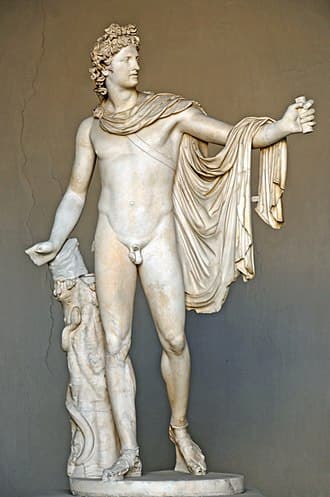
Apollo Belvedere, ca. 120—140 CE (Vatican)
Hans Werner Henze: Apollo et Hyazinthus (Nicole Pieper, also; Jan Croonenbroeck, harpsichord; Ensemble Horizonte; Jörg-Peter Mittmann, cond.)
Ares – son of Zeus, God of war
American composer Peter Boyer (b. 1970) was commissioned by the Conductor’s Institute to write a work with ‘three contrasting movements or sections’ that could require different techniques from conductors for each section. The final movement of his work for string orchestra, Ares, is one of restless rhythm and gave the composer ‘a chance to exploit some of the more menacing effects of which strings are capable’.
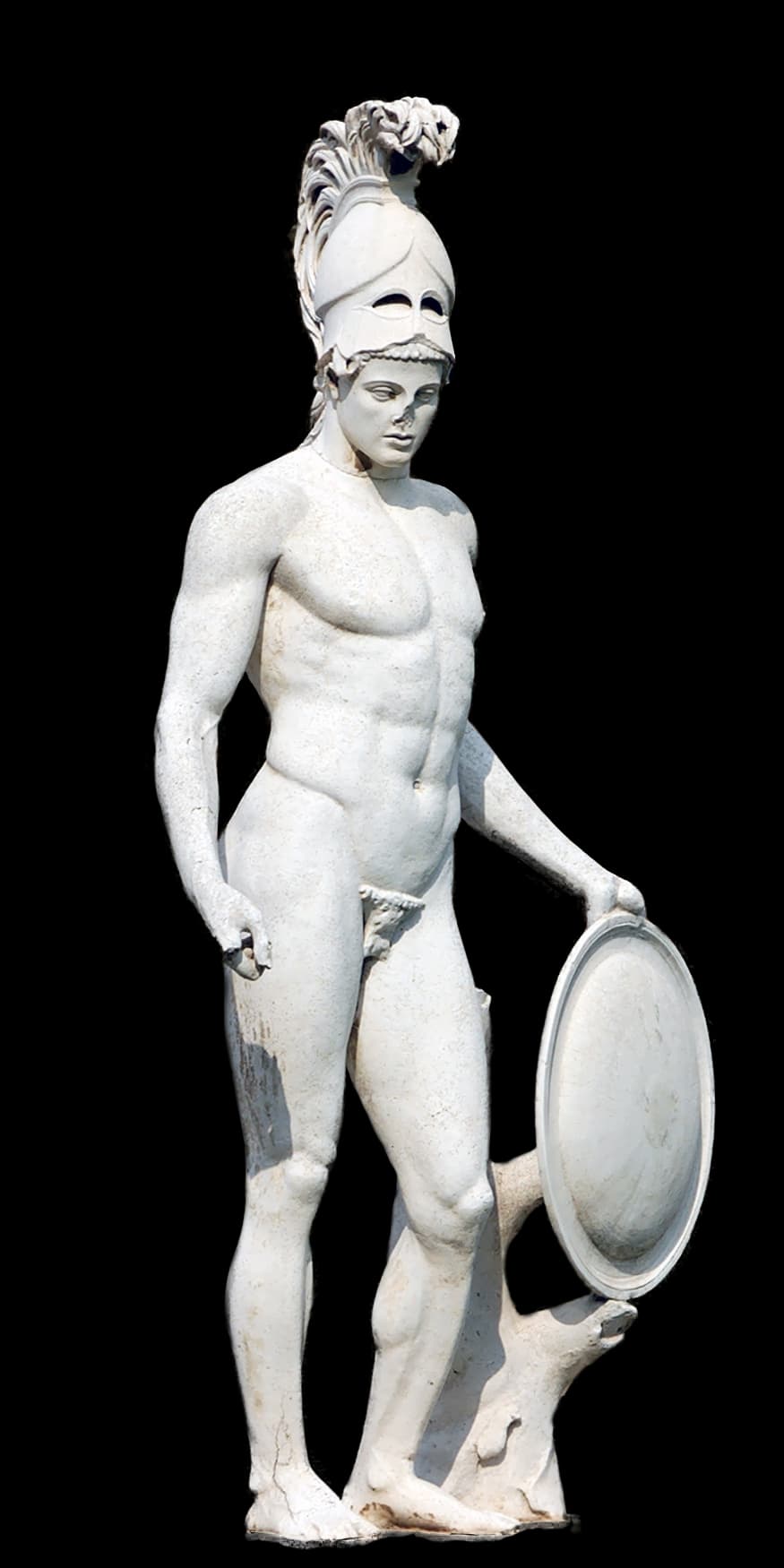
Ares (Villa Adriana)
Peter Boyer: Three Olympians – III. Ares (London Philharmonic Orchestra; Peter Boyer, cond.)
Hephaestus – son of Hera, God of blacksmiths, sculptors, and volcanos
Hephaestus is the god of blacksmiths and so we hear this in Oscar Navarro’s movement from his El Olimpo de los Dioses. Navarro (b. 1981), sees Hephaestus as the object of veneration for all blacksmiths. They gather around him and sing a hymn to him over and over. Other blacksmiths, sculptors, and artisans join in until there’s a final explosion of first and ecstasy.
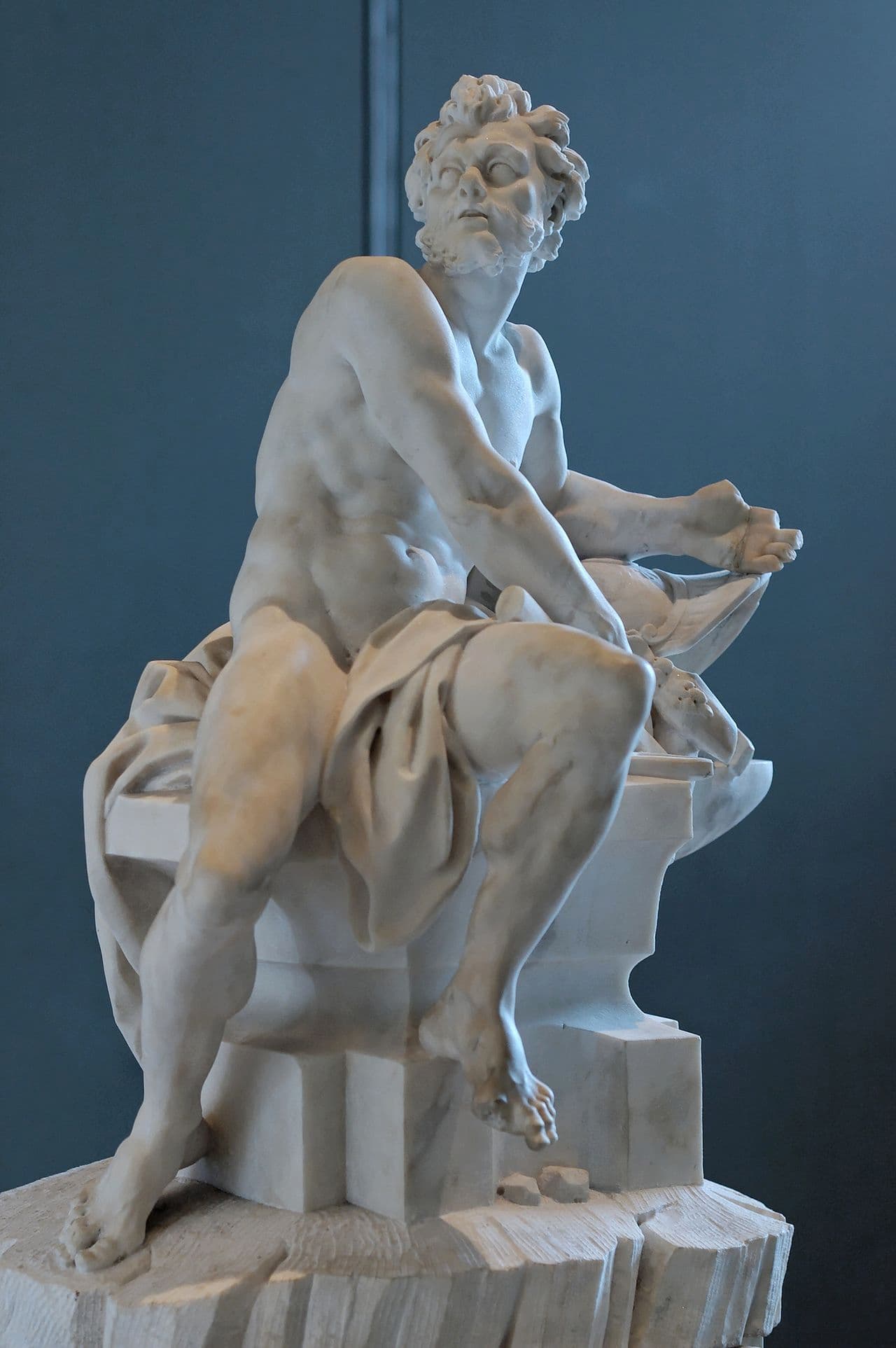
Guillaume Coustou the Younger: Hephaestus at the Forge, 1742 (Louvre)
Oscar Navarro: El Olimpo de los Dioses – VI. Hephaestus (Showa Wind Symphony; Eugene Migliaro Corporon, cond.)
Hermes – son of Zeus, Herald of the Gods
Edwin Rosburgh (b. 1937), himself an oboist, wrote music that challenged the accepted capabilities of the humble instrument by extending the techniques required, such as multiphonics. His set of three character pieces, Aulodie, takes Hermes as its second theme and seems to show him in his messenger mode, running everywhere with information and news.
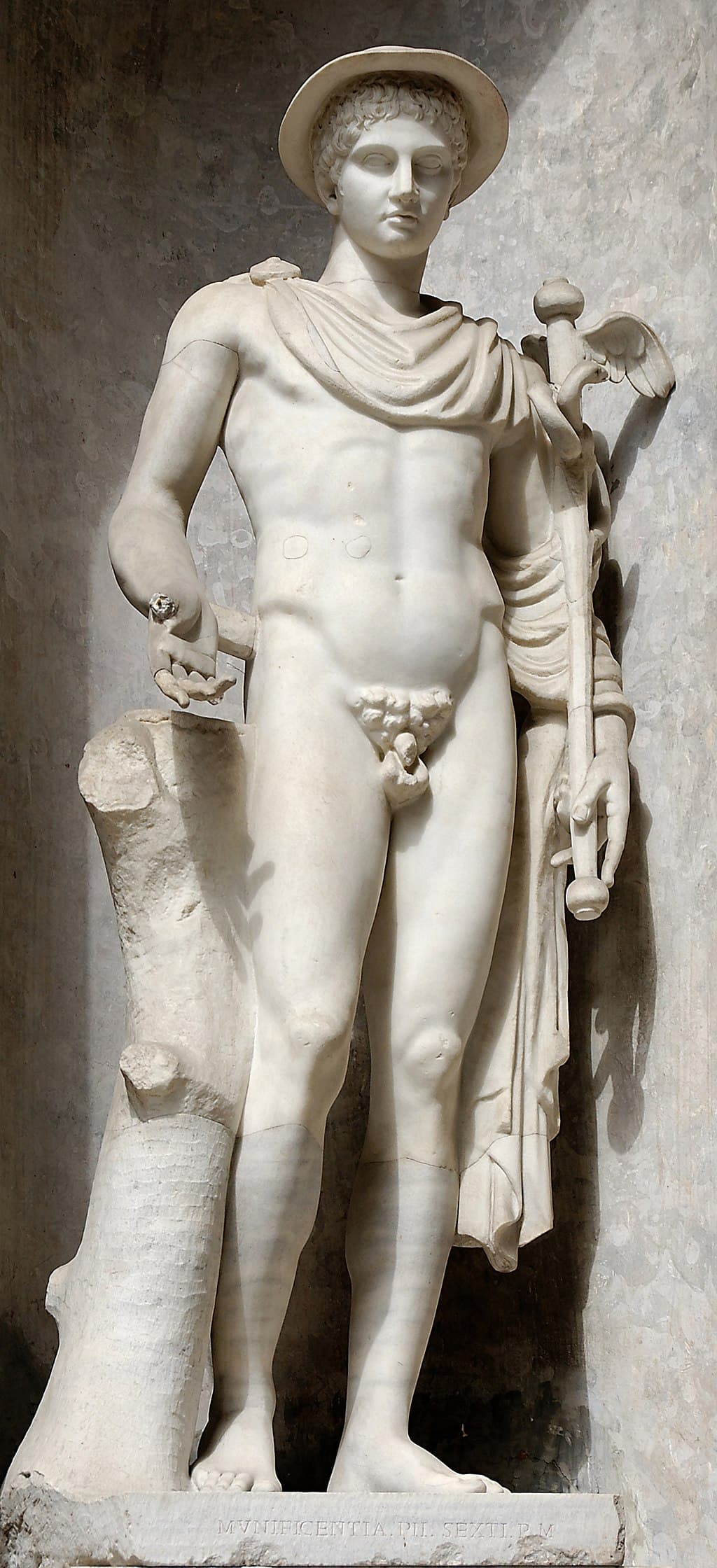
Hermes (Vatican Museums)
Edwin Roxburgh: Aulodie – Hermes (Christopher Redgate, oboe; Stephen Robbings, piano)
Dionysus – son of Zeus, God of the grape and theatre
American composer Dan Welcher (b. 1948 ) chose Greek imagery for this work for clarinet, violin, and piano. Entitled Phadrus, the first movement Apollo’s Lyre, shows the philosophical side of the composer. The second part, Dionysus’ Dream-Orgy (Ritual Dance), takes on the composer’s other side: unbridled energy and an unmetered orgy.
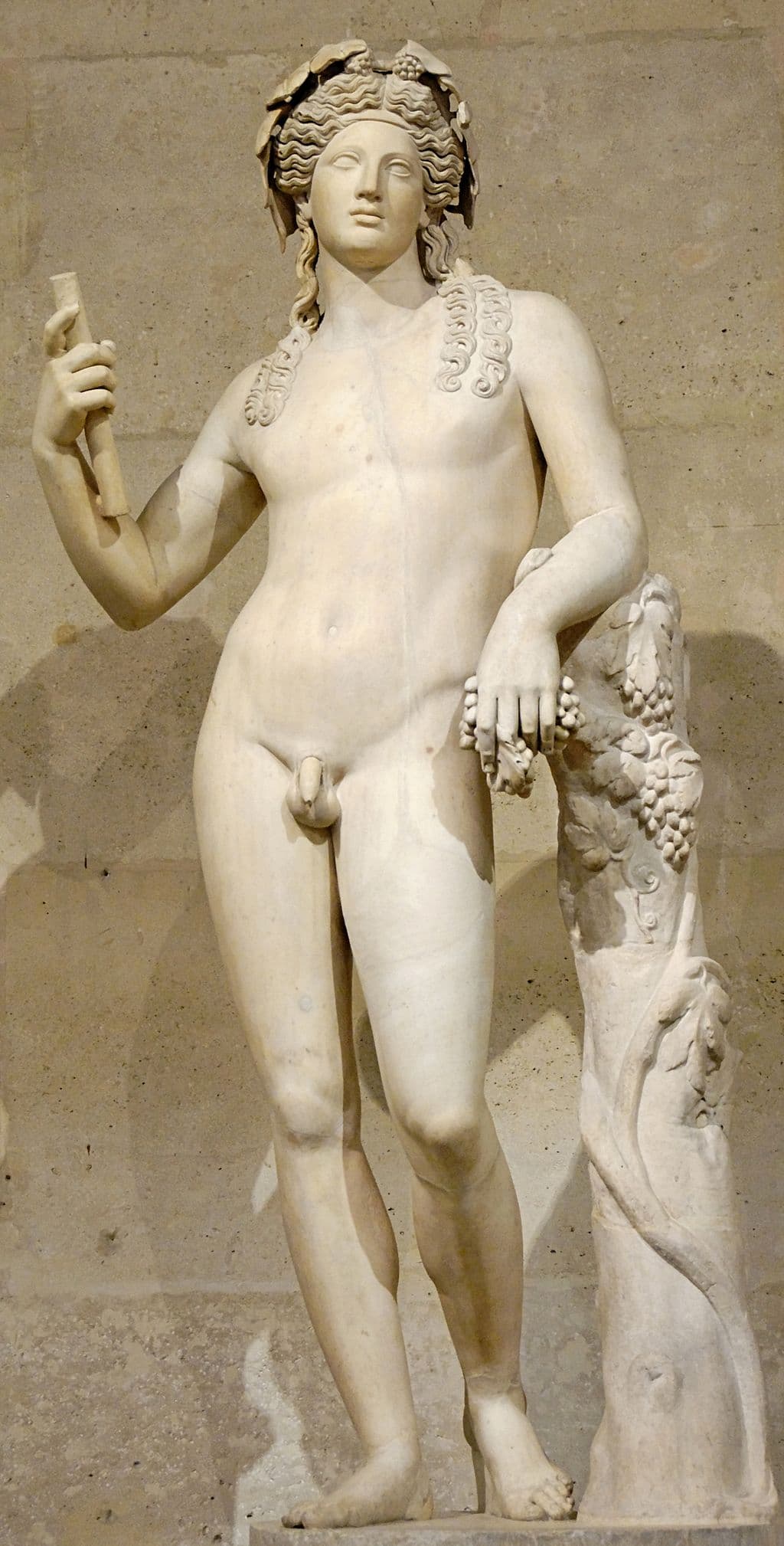
Dionysus (Louvre)
Dan Welcher: Phaedrus – II. Dionysus’ Dream-Orgy (Verdehr Trio)
These might not have been the gods in music that you were expecting but it’s interesting to see how they continue to have an inspirational value today.
For more of the best in classical music, sign up to our E-Newsletter

